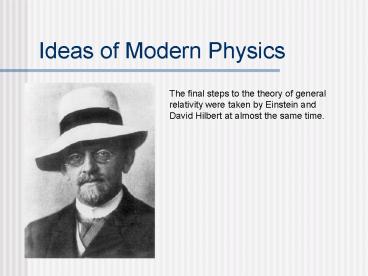Ideas of Modern Physics - PowerPoint PPT Presentation
1 / 22
Title:
Ideas of Modern Physics
Description:
The final steps to the theory of general relativity were taken by ... It might have some kind of donut or more complex topology at large or microscopic scales. ... – PowerPoint PPT presentation
Number of Views:24
Avg rating:3.0/5.0
Title: Ideas of Modern Physics
1
Ideas of Modern Physics
The final steps to the theory of general
relativity were taken by Einstein and David
Hilbert at almost the same time.
2
Review
- Origins of the general theory of relativity
- The principle of equivalence
- Consequences for geometry
3
Today
- The general theory of relativity
- Mechanics in relativity
- Cosmology and holes in space-time
http//antwrp.gsfc.nasa.gov/apod/ap001031.html
Galaxies falling into a hole.
4
Idea behind geometric theory
- Matter bends space and time.
- Bending on a 2-d surface is characterized by
curvature (C1/R_1R_2)) at each point which
says how the surface accelerates away from a
plane. Bending in higher dimensions is
characterized by curvature in each hyper plane at
each point. How can we relate curvature to matter?
5
Einsteins solution
- Einstein guessed that the curvature functions
(meter-2) are proportional to the local energy
and momentum densities (kg/m3). - The proportionality constant that emerged from
comparison with Newtonian theory in the limit of
weak gravitational fields is 8pi 8piG/c2 where
G is Newton's constant.
Differential tensor field equations not shown!
6
Curvature of space
- We can estimate the magnitude of the curvature of
space at a distance r from a single static mass M
by dimensional analysis. Assume - C MG ca/rb
- with integers a, and b. This quantity has
dimensions of inverse area if a-2, and b3.
7
Near the Earth
- The ratio of the curvature of space on the
surface of the Earth to the curvature of the
surface of the Earth is - C/(1/r2) MG/(c2r) 7e-10
- The curvature of space near Earth is so small as
to be usually unnoticeable.
8
Gravitational time dilation
- At 10,000 km, a clock should run 4.5 parts in
1010 faster than one on the Earth. Comparing
timing pulses from atomic oscillator clocks
confirms the gravitational time dilation in 1976
to within 0.01. Corrections are now standard in
the synchronizing satellites.
http//hyperphysics.phy-astr.gsu.edu/hbase/relativ
/gratim.htmlc1
9
Mechanics in general relativity
- Einsteins theory reproduces Newtonian mechanics
when curvature is small. - Relativity is manifest as an approximate 1/r4
correction to Newtons 1/r2 force law, largest
at small r so near a mass. - Relativistic effect are observed in satellite
motions.
10
Precession of Mercury
- Deviations from closed elliptical orbits result
from deviations from Newtons 1/r2 law. The axis
of the orbit of Mercury (closest to the Sun so
most sensitive) precesses due to the other
planets. Relativity explains an excess of 40
arcsec per century as calculated by Einstein.
11
Gravomagnetism
- Relativity theory requires a velocity dependent
component to gravitational interaction rather
like magnetism in electromagnetic theory. - A spinning mass behaves as a gravomagnet and two
spinning masses interact through gravomagnetism.
12
Gravitational radiation
- Einsteins theory addresses gravitational action
at a distance as follows. - If a mass is jiggled, ripples of space-time
curvature carry the signal. - Gravitational radiation carries energy and
momentum and wiggles stuff in its path.
13
Evidence for gravity waves
- In 1974, Joseph Taylor and his student Russell
Hulse discovered a binary neutron star system
losing energy as expected from gravitational
radiation.
14
Direct detection
- LIGO is a collection of large laser
interferometers searching for wiggles generated
by exploding stars.
http//www.ligo.caltech.edu/
15
Black holes
- Light falls in a gravitational field. A
sufficiently strong field should bind light into
orbits. When escape velocity v2GM/r1/2c,
nothing can emerge. - Inside the Schwarzschild radius
r_s2GM/c2(1/2), light itself cannot escape.
An object condensed within its Schwarzschild
radius is called a black hole.
16
Theory of compact objects
- Matter in the earth is held up by electric
forces. - In the Sun, matter is held up by pressure
associated with high temperature by nuclear
fusion reactions. - At higher density when fusion burns out, gravity
can squeeze electrons into protons forming a
neutron star.
17
Black hole formation
- At sufficient density, no known force prevents
the complete collapse of matter to a point- a
hole. - Matter falling into black holes provides the only
explanation for energetic objects seen throughout
the universe.
http//antwrp.gsfc.nasa.gov/apod/ap010921.html
Black hole roaming the Milky Way.
18
Artists rendition
- Spinning black hole with accretion disk.
http//antwrp.gsfc.nasa.gov/apod/ap011029.html
19
A hot black hole candidate
http//antwrp.gsfc.nasa.gov/apod/ap021005.html
20
Example black hole candidates
- Two galaxies colliding, central huge black holes
merging.
http//antwrp.gsfc.nasa.gov/apod/ap021128.html
21
Geometry of the universe
- The surface of a cylinder is finite in one
dimension. The surface of a sphere is completely
finite. Einstein suggested our universe might be
finite like the surface of a sphere. It might
have some kind of donut or more complex topology
at large or microscopic scales.
22
Astrophysics and cosmology
- In Einsteins theory, geometry and matter go hand
in hand. To discover the geometry of the
universe, we have to look at the matter and
understand what we can see.
http//antwrp.gsfc.nasa.gov/apod/ap021012.html











![L 34 Modern Physics [1] PowerPoint PPT Presentation](https://s3.amazonaws.com/images.powershow.com/7125701.th0.jpg?_=20150905079)


![L 35 Modern Physics [1] PowerPoint PPT Presentation](https://s3.amazonaws.com/images.powershow.com/7552279.th0.jpg?_=20160119094)
![L 33 Modern Physics [1] PowerPoint PPT Presentation](https://s3.amazonaws.com/images.powershow.com/7602675.th0.jpg?_=201602121011)















